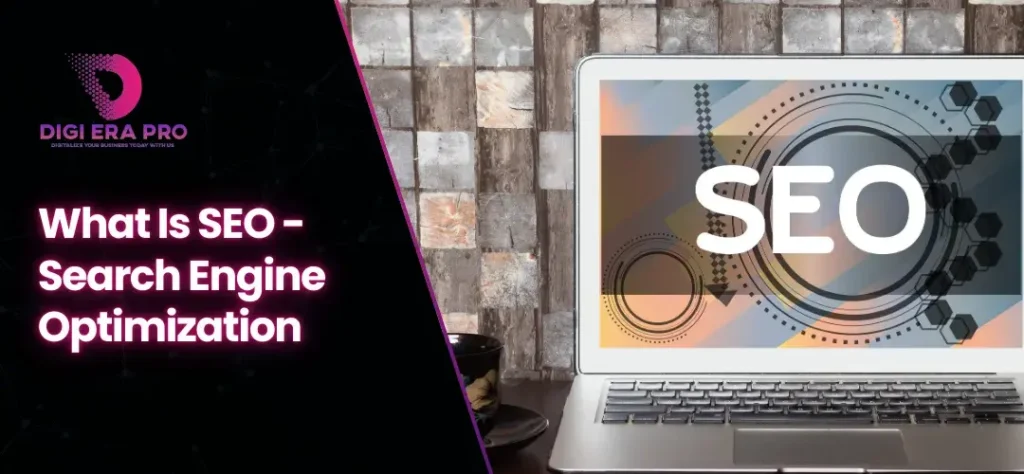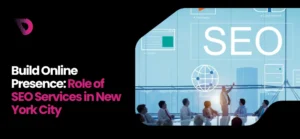Digi Era Pro LLC is an award-winning web development agency...
Read MoreBlog
What Is SEO - Search Engine Optimization?
Search Engine Optimization (SEO) is the process of improving the visibility of a website or web page in search engine results pages (SERPs). In simpler terms, SEO is all about optimizing your online presence so that search engines like Google can find, index, and rank your content in the most relevant way. The higher your website ranks, the more likely people will find it when searching for topics, products, or services related to what you offer.

Key Components of SEO
- On-Page SEO
On-page SEO refers to the optimization of elements within your website that impact search rankings. This includes:- Keywords: The words or phrases users search for. Properly using relevant keywords on your website can help search engines understand your content.
- Meta Tags: Title tags and meta descriptions that provide a concise summary of your page’s content to both users and search engines.
- Content Quality: High-quality, informative, and relevant content that meets the needs of your audience. This is a key ranking factor.
- Internal Linking: The practice of linking to other pages within your website, which helps search engines understand the structure of your site and can boost rankings.
- Keywords: The words or phrases users search for. Properly using relevant keywords on your website can help search engines understand your content.
- Off-Page SEO
Off-page SEO focuses on activities outside of your website that affect its search engine rankings. This includes:- Backlinks: Links from other websites pointing to your site. High-quality backlinks from reputable sources can improve your site’s authority and rankings.
- Social Media: Activity on social media platforms can drive traffic to your site and indirectly improve SEO through increased engagement and brand awareness.
- Backlinks: Links from other websites pointing to your site. High-quality backlinks from reputable sources can improve your site’s authority and rankings.
- Technical SEO
Technical SEO involves the backend elements of your website that affect its performance in search rankings, including:- Website Speed: Fast-loading websites provide a better user experience and are favored by search engines.
- Mobile-Friendliness: Since more people search using mobile devices, having a mobile-friendly website is crucial for SEO.
- Site Architecture: Proper organization of your site structure and URL hierarchy makes it easier for search engines to crawl and index your pages.
- Website Speed: Fast-loading websites provide a better user experience and are favored by search engines.
- User Experience (UX)
The user experience is a critical part of SEO. Search engines prioritize websites that offer a positive, user-friendly experience, including:- Easy navigation
- Clean design
- Relevant content
- Minimal pop-ups and interruptions
- Easy navigation
Why SEO Matters
- Increased Traffic: Ranking higher on search engines means more people will visit your website, leading to increased organic traffic.
- Cost-Effective: Compared to paid advertising, SEO is a long-term, cost-effective strategy for attracting visitors without spending money on ads.
- Credibility and Trust: Websites that rank high in search results are generally perceived as more credible by users.
- Better User Experience: Many SEO practices, such as improving site speed or creating useful content, also improve the user experience, which can lead to higher engagement and conversions.
How Search Engines Rank Websites
Search engines like Google use complex algorithms to evaluate and rank websites. While the exact algorithm is a secret, key ranking factors include:
- Relevance of Content: How well your content matches user intent and answers their search query.
- Backlink Quality: Websites that have earned backlinks from trusted sources are more likely to rank higher.
- Website Performance: Fast-loading websites are favored, as they provide a better user experience.
- Content Freshness: Websites with regularly updated, relevant content are more likely to be ranked higher.
Conclusion
In today’s digital world, SEO is a crucial part of any online strategy. By optimizing your website to meet the standards set by search engines, you can improve your website’s visibility, drive more traffic, and ultimately, grow your business. Whether you’re running an e-commerce site, a blog, or a business website, understanding and implementing SEO is essential to your online success.
Recent Posts
Web Design & Development Agency in New York | Digi Era Pro LLC
Looking for a top-rated web development agency in New York?...
Read MoreBuild Online Presence: Role of SEO Services in New York City
In a city as competitive as New York, having a...
Read MoreTop 10 Website Design Companies in New York, NY (2025)
In today’s digital-first world, your website is often the first...
Read More


